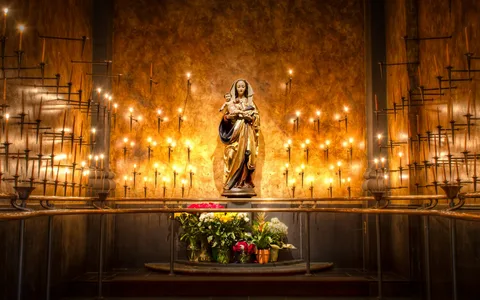Meaning
Spanish Origin
The name *Milagros* is of **Spanish** origin, meaning “miracles.”
It is a feminine given name, popular in Spanish-speaking countries.
The name is derived from the noun *”milagro,”* which translates to “miracle” in English.
This suggests that individuals named Milagros are often associated with extraordinary or awe-inspiring events, or perhaps seen as bearers of hope and blessings.
Due to its evocative meaning, *Milagros* has gained popularity beyond Spanish-speaking communities, appearing in other cultures and languages.
Significance of “Miracles”
The word “miracle,” steeped in both wonder and awe, holds a profound significance across cultures and throughout history. Its etymological roots trace back to the Latin “mirabilis,” meaning “wonderful” or “marvellous.” This inherent association with the extraordinary underscores the core essence of a miracle: an event defying natural laws, exceeding human understanding, and often attributed to a divine or supernatural force.
Throughout history, miracles have served as powerful symbols of faith, hope, and divine intervention. In religious contexts, they are seen as concrete manifestations of God’s power and presence in the world. From parting seas to healing the sick, these extraordinary occurrences reinforce belief systems and inspire devotion. The Bible, for instance, is replete with accounts of miracles performed by Jesus Christ, solidifying his divinity and validating his message.
Beyond religious contexts, miracles have also found their place in secular narratives, serving as catalysts for transformation and transcendence. They often represent moments of sheer serendipity or improbable good fortune that defy rational explanation. Literature, film, and even personal anecdotes are filled with stories of miraculous escapes, unexpected discoveries, and life-altering events that leave individuals forever changed.
The concept of a miracle inherently challenges our understanding of the world and our place within it. It raises fundamental questions about the nature of reality, the limits of human knowledge, and the existence of forces beyond our comprehension. Whether interpreted through a religious lens or as a testament to the inherent wonder of the universe, miracles continue to captivate our imaginations and inspire both awe and reflection.
Ultimately, the significance of miracles lies in their ability to transcend the mundane and connect us to something greater than ourselves. They serve as reminders of the mysteries that surround us, the power of hope, and the enduring human quest for meaning and understanding.
History
Early Usage
Milagros is a feminine given name with Spanish origins, meaning “miracles.”
Its etymology traces back to the Latin word “mirabilis,” which signifies “wonderful” or “astonishing.”
Over time, “mirabilis” evolved into “milagro” in Spanish, denoting a miracle.
The name Milagros carries a deep religious connotation, often associated with divine intervention and acts of grace.
- In Catholicism, miracles are considered extraordinary events attributed to the power of God or saints.
- Milagros was likely popularized during periods when miracles were widely reported and celebrated within religious communities.
The name gained traction in Spanish-speaking regions, particularly in Latin America, where Catholicism played a significant role in shaping cultural traditions.
While Milagros is primarily associated with Hispanic cultures, its meaning of “miracles” has resonated across linguistic and cultural boundaries, leading to its adoption in other parts of the world.
Evolution Through Time Cultural Impact
Milagros, a name resonating with charm and meaning, holds a rich history entwined with cultural traditions. Its roots lie in the Spanish language, where “milagro” translates to “miracle.”
This inherent connection to the extraordinary imbues the name Milagros with a sense of wonder and divine favor.
The name’s popularity has flourished across various cultures, particularly in Latin America, where it’s deeply rooted in Catholic tradition. Miracles play a significant role in religious belief systems, often attributed to divine intervention or blessings.
Therefore, bearing the name Milagros suggests an association with these miraculous occurrences, signifying hope, faith, and the extraordinary within everyday life.
The cultural impact of the name extends beyond its religious connotations. In many Hispanic communities, Milagros is considered a name bestowed upon individuals who embody qualities of resilience, strength, and unwavering spirit.
This association stems from the belief that miracles often arise amidst challenging circumstances, highlighting the indomitable nature of those bearing the name.
Moreover, Milagros has transcended geographical boundaries, gaining recognition in diverse cultures around the world. Its melodic sound and inherent meaning continue to captivate parents seeking a name that embodies hope, wonder, and strength.
Prevalence in Different Regions
Milagros is a Spanish name meaning “miracles.” Its origin lies in Latin, with “mirabilis” meaning wonderful or marvelous, which evolved into “milagro,” signifying a miracle.
The name has deep historical roots in the Catholic faith, as miracles are often associated with religious events and figures. It likely gained popularity as a given name in regions heavily influenced by Catholicism, particularly in Spain and Latin America.
In Spain, Milagros is predominantly found in the Basque Country and Catalonia regions. Its prevalence reflects the strong Catholic heritage of these areas and the cultural significance of miracles within their traditions.
Throughout Latin America, the name Milagros holds considerable popularity, particularly in countries such as Mexico, Peru, and Colombia. This widespread use can be attributed to the Spanish colonization of these regions, which introduced Catholicism and its associated names into local cultures.
Despite its origins in Spain and Latin America, Milagros has also found its way into other parts of the world. While less common, it appears in countries like the United States, where Hispanic immigration has contributed to the name’s presence.
Today, Milagros remains a cherished name for parents seeking a meaningful and beautiful choice for their daughters. It carries with it a sense of wonder, hope, and faith, reflecting the enduring power of miracles throughout history.
Notable Individuals Named Milagros
Milagros is a Spanish feminine given name meaning “miracles.” It’s derived from the Latin word “mirabilia,” which means “wonderful things” or “marvelous deeds.”
The name’s popularity likely stems from its religious connotations. In Catholic tradition, miracles are seen as divine interventions and powerful demonstrations of God’s power. Therefore, a child named Milagros would be associated with hope, faith, and the extraordinary.
Throughout history, the name has been primarily used in Spanish-speaking countries, particularly in Latin America. It has also gained some traction in other parts of the world due to globalization and cultural exchange.
While specific historical figures named Milagros are not widely documented, the name’s enduring presence suggests its significance across generations.
It’s important to note that the meaning and cultural associations of a name can evolve over time and vary across different regions and communities.
- Best LeadsGorilla Alternatives for 2025 - April 26, 2025
- Best Overloop Alternatives for 2025 - April 25, 2025
- Best Lead411 Alternatives for 2025 - April 25, 2025


